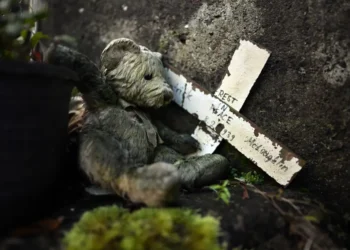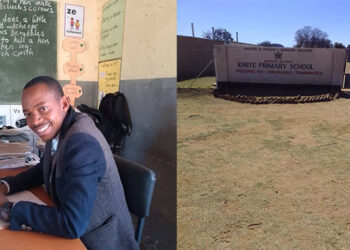In December of last year, a rather unfortunate incident occurred in Kwekwe, where Mrs. Elizabeth Rusike, a 59-year-old resident, found herself knee-deep in a sinkhole.
The ground beneath her collapsed while she was hanging clothes on a washing line, revealing an underground tunnel that had been dug by illegal miners.
Mrs. Rusike and her family had been living in their house for 23 years, unaware that it was situated on top of a mining tunnel. Their home was located in the Globe and Phoenix area of Kwekwe, known for rampant illegal mining activities.
This area had previously witnessed the collapse of a local primary school into another mining tunnel several months prior, resulting in injuries to students.
When reporters visited Mrs. Rusike’s home, they discovered that her two children, Kimberly and Charles, were staying with a neighbour. It has been nearly a year since their house collapsed, and they have lost hope of rebuilding it. The family now faces homelessness and uncertainty about their future.
Kimberly expressed the distress caused by the situation, explaining how her family had transitioned from living in a spacious 10-roomed house to renting a small place due to the impact of illegal gold mining activities. The abandoned house is no longer safe for habitation, as it has developed significant cracks and could collapse at any moment.
The family experienced the initial sinkhole incident in December when Mrs. Rusike was nearly swallowed by the ground while hanging clothes. They assumed it was due to the wet ground at the time. In March, they started hearing noises emanating from underground, disturbing their sleep. These noises were a result of ongoing mining activities beneath their house. Fearing for their safety, they decided to vacate the premises. Subsequently, a blast from neighbouring mines caused further damage to their already compromised house, with the chimney disappearing into the deep pit below.
Mr. Fortune Mpungu, the Kwekwe District Development Coordinator, advised the Rusike family to approach the local authority to seek a new residential stand. He mentioned that a final decision regarding other affected houses would be made once the report from the Zimbabwe National Geo Special and Space Agency (ZINGSA) becomes available.
Furthermore, due to the impact of illegal mining activities, government departments housed in a government building in Kwekwe were also instructed to vacate. This historic building, originally the Globe and Phoenix Mine Post Office constructed over a century ago, housed offices such as the DDC’s offices, Civil Registry, Magistrate Court, the District Development Fund (DDF), and the Ministry of Information, Publicity, and Broadcasting Services.
The situation in Kwekwe is concerning, as several illegal mining tunnels are present beneath the city, posing a significant risk. The longest known tunnel stretches a staggering 43 kilometers in length and reaches a depth of 873 meters. Unlike the previous mining practices that left supporting pillars intact, illegal miners are destroying these essential pillars in their quest for gold.
The Globe and Phoenix Mine, during its operation, contributed significantly to the city’s development. It produced over 4.2 million ounces of gold with an average grade of 27.6 grams per tonne. The mine played a role in constructing various infrastructure in Kwekwe, including schools, housing for workers and management, the Old Post Office, and the Phoenix Hotel (now Shumba Hotel), among other buildings.
The presence of these illegal mining activities beneath the city poses not only a danger to residents but also raises concerns about the long-term stability and safety of the area.
Source:MyZimbabwe









